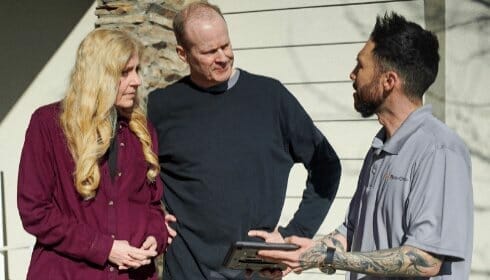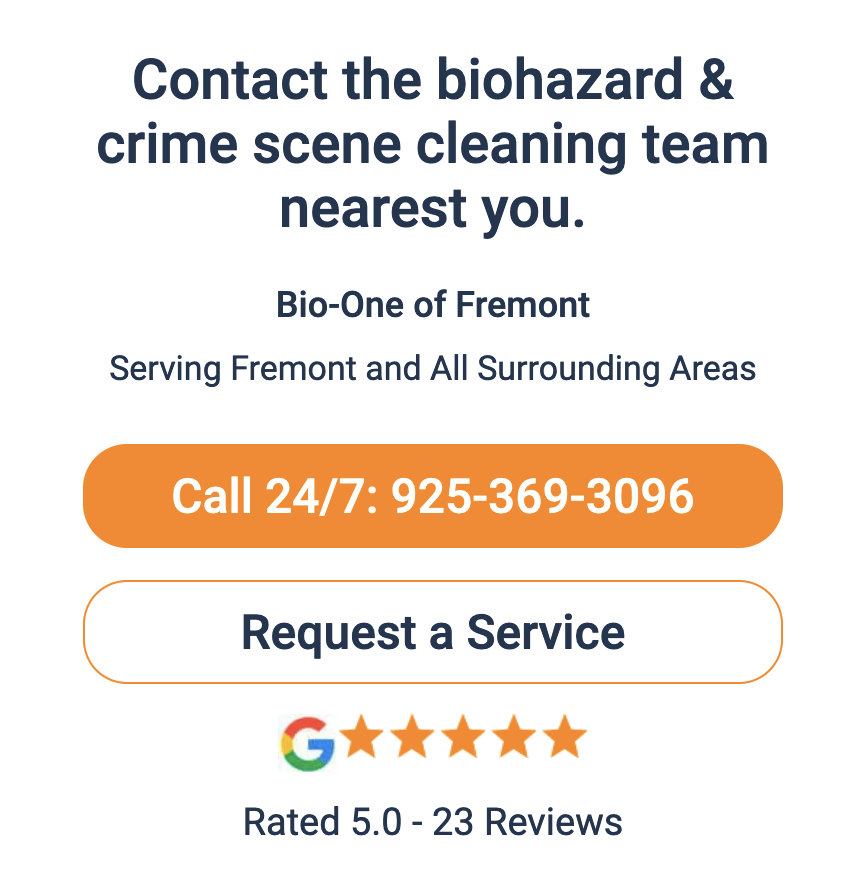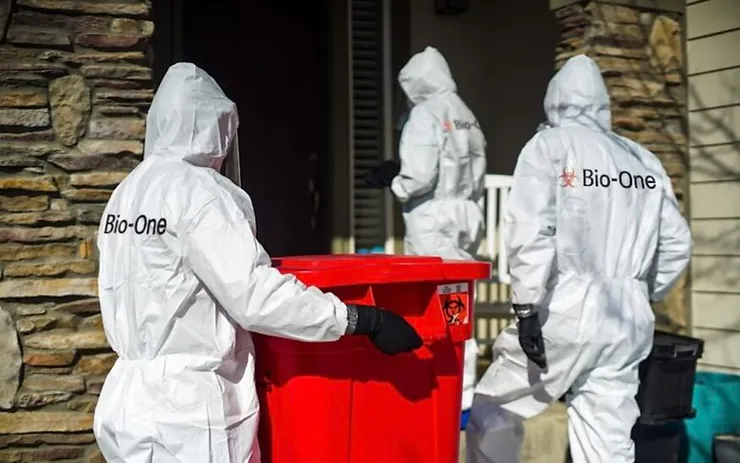
When we hear the term "biohazard," it might conjure images of a lab experiment gone wrong or a movie scene featuring hazardous materials. In reality, biohazards are much closer to home than most people realize—and they often require immediate attention to ensure safety.
At Bio-One Fremont, we specialize in addressing biohazard situations, providing expert cleanup services to restore spaces to safety and normalcy throughout the San Francisco Bay Area (Alameda, Santa Clara, San Mateo, San Francisco) and surrounding counties (Contra Costa, San Joaquin, Sonoma, Napa, Vallejo). But what exactly qualifies as a biohazard, and why is professional cleanup so important?
A biohazard, short for biological hazard, refers to any biological substance that poses a risk to human or animal health. These hazards can spread disease, contaminate environments, and create significant health risks if not properly handled and decontaminated.
Common biohazards include:
Bio-One Fremont specializes in cleaning and restoring spaces affected by a wide range of biohazard scenarios. Here’s a closer look at the services we provide:
The emotional toll of these situations is immense, and the cleanup process can be just as overwhelming. We handle these cases with compassion and discretion, ensuring the area is thoroughly cleaned and decontaminated.
Whether due to accidents, medical emergencies, or trauma, blood spills require expert attention to remove biohazards and prevent contamination.
Human and animal waste can carry harmful pathogens, making proper removal and sanitization critical for safety. Whether it’s a one-time incident or part of a larger cleanup, we ensure thorough decontamination.
Hoarding situations often involve not just clutter but also biohazards such as mold, animal droppings, and pests. We handle these complex cases with sensitivity and care.
Odors from hoarding, spoiled food, feces, cigarette smoke, marijuana smoke, and other sources can linger and create unlivable environments. We use specialized techniques and equipment to neutralize odors at their source, ensuring a fresh, clean space.
Mold isn’t just unsightly—it can trigger respiratory problems and exacerbate allergies. We identify and remove mold to ensure a safe and healthy space.
Handling biohazards isn’t just a cleaning task—it’s a critical health and safety measure. Attempting to clean up biohazards without proper training and equipment can expose you to harmful pathogens and increase the risk of contamination.
At Bio-One Fremont, we:
Biohazards are not just messes—they’re potential threats to health and safety. That’s why Bio-One Fremont is available 24/7 to respond to your needs with expertise, compassion, and professionalism.
If you’re dealing with a biohazard situation, don’t wait. Contact us today for a free, no-obligation quote. Call 925-369-3096 or visit BioOneFremont.com to learn more about how we can help.
Your safety is our priority. Let us handle the tough jobs so you can focus on moving forward.

When facing a biohazard cleanup, hoarding situation, or other challenging cleanup needs, uncertainty about costs can add unnecessary stress. That’s why at Bio-One Fremont, we take pride in offering free, no-obligation “Not To Exceed” quotes. This means the price we quote is the maximum you’ll pay—no lowball offers, no surprise add-ons after the job begins.
Here’s why our approach to quoting services is a game-changer and how it reflects our commitment to transparency, honesty, and exceptional customer care.
Cleaning up biohazards, hoarding environments, or infestations can involve many variables, making it impossible to accurately quote a job without seeing the space. By offering a free on-site inspection, we provide a detailed estimate that covers every aspect of the job.
And with our “Not To Exceed” promise, you can rest assured that the price you’re quoted is the highest you’ll pay. If the job ends up being simpler than expected, we’ll adjust the cost down—but we’ll never go above the quoted amount.
Unfortunately, some companies lure customers with low initial prices, only to tack on charges as the job progresses. At Bio-One Fremont, we believe this practice is unfair and unethical. Our “Not To Exceed” quotes eliminate this concern, giving you the confidence to move forward without fear of surprise charges.
Every cleanup situation is different, and we treat it as such. By conducting an on-site evaluation, we can create a tailored plan that addresses your specific challenges—whether it’s a biohazard, hoarding cleanup, or rodent infestation.
The result? A comprehensive and transparent estimate that reflects the scope of work required, with no guesswork involved.
Many of our clients reach out during emotionally challenging periods, such as the loss of a loved one or the discovery of a hazardous situation in their home. The last thing they need is added financial stress.
Our “Not To Exceed” quotes provide peace of mind by ensuring:
When we say “free quote,” we mean it. There’s no obligation to proceed with our services after receiving your estimate. Our goal is to empower you to make an informed decision without any sales pressure.
At Bio-One Fremont, we understand that trust is earned. By committing to “Not To Exceed” quotes, we demonstrate that we’re serious about delivering on our promises. This approach ensures you can focus on the cleanup process, not worry about unexpected costs.
If you’re facing a challenging cleanup and need expert assistance, contact Kevin Jameson and the Bio-One Fremont team. We’re available 24/7 to provide free, no-obligation “Not To Exceed” quotes and help you take the first step toward restoring your space.
Call us at 925-369-3096 or visit BioOneFremont.com to schedule your consultation today.
Compassion. Integrity. Results. That’s the Bio-One Fremont promise.
The origins of crime- and trauma-scene cleaning services can be traced back to the 1990s when only a handful of companies operated in this industry. At that time, the field lacked regulation, and awareness of contamination risks was minimal.

"I was young and inexperienced and found myself in a situation straight out of a movie. I quickly took action to assist a woman in her time of dire need, and that's how I entered the crime scene and cleaning business," shared Nick-Anthony Zamucen, Founder of Bio-One Inc. Read more about Nick's journey in Franchise Times.
Today, the landscape has changed dramatically, with hundreds of companies advertising crime and trauma scene cleaning services. However, navigating through this multitude of options during one of life's most traumatic moments can be overwhelming. To help you make an informed decision, we've compiled a list of questions to ask before selecting a crime and trauma scene company.
When evaluating crime and trauma scene cleaning technicians or business owners, asking the right questions is crucial to finding the best fit for your needs and circumstances.
Above all, ensure that the company you choose demonstrates care and compassion for your situation. Their primary focus should be on providing support and assistance to you and your loved ones during this challenging time.
If you're in need of a compassionate and professional crime and trauma scene cleaner, Bio-One Fremont is here for you. All our offices operate by the motto "Help First, Business Second" and are available 24/7. Reach out to us or click here to locate a Bio-One team near you.

Fremont, CA - Family-owned and operated, Bio-One of Fremont is a leader in crime scene cleanup and biohazard decontamination services in Alameda, Contra Costa and Santa Clara Counties.
Whether you need help remediating a crime scene, suicide, or other trauma event in the San Francisco Bay Area, they are ready to answer the call.
Since joining the Bio-One family, Bio-One of Fremont has continually grown and provided a very valuable service to families around the Bay area.
The scenes they remediate are often overwhelming and dangerous, but the crew are trained and experienced and here for you. It is a wonderful service they provide.
Kevin Jameson, owner, states - "We hope you never need our service, but in the case of an unattended death, suicide, or a violent crime, Bio-one of Fremont is here to help families and loved ones so that they do not have to go through additional trauma of cleaning up. Our goal is to allow families to start the grieving and healing process while we restore the property for them".

As a former crime scene technician, Kevin describes that when there is a death, only the body is removed and the family is left with the aftermath. That's where Bio-One helps. Using proper equipment to remove biohazards and medical waste safely in addition to proper PPE and hazmat suits, Bio-One allows the family to safely return to their home.
Most jobs are covered by homeowners insurance, and Bio-One of Fremont realizes that working with an insurance company can be overwhelming during difficult times. Bio-One of Fremont has dedicated staff who work directly with your insurance company from opening a claim to submitting all necessary documentation to close it upon completion.
"Anything trauma scene-related or death-related is typically covered by homeowners insurance so our clients only pay a deductible for our services"
Coordinating with the insurance company allows family members to focus on healing and supports Bio-One of Fremont's motto, "Help First, Business Second"!
A portion of their business is also hoarding. You can find a guide on their website.
They also provide cleaning for people with mental health or mobility issues. Bio-One of Fremont crew members are certified in Mental Health First Aid and have completed additional training with the San Francisco County Department of Mental Health to further assist their clients.
Additionally, Bio-One does cleanouts when residents or tenants leave behind a large mess or odors related to mold, cigarette and cannabis smoke.
Bio-One provides many services and resources which can be found on its website.
They answer the call 24/7 and are here to help you.
Their company vehicles are also unmarked for your privacy.
Bio-One of Fremont has a 5-star rating and have received numerous testimonials which can be found on their website.
Located in Fremont and Livermore, you can reach them by phone at 925-369-3096 or via email at mailto: info@bioonefremont.com
Find them on Facebook at www.facebook.com/bio.one.fremont or visit their website at www.bioonefremont.com.

In times of family crisis, such as the loss of a loved one, unattended death, or a traumatic crime scene, the last thing you want to worry about is the cost of cleaning and restoring your property. Fortunately, many insurance policies cover these traumatic situations, providing a lifeline for those in need. Bio-One, with over 15 years of experience in trauma and crime scene cleanup, understands the challenges and complexities associated with these situations. That's why we're dedicated to working directly with your insurance provider to make the process as smooth as possible, from opening the claim to completing the project. This not only eases the financial burden but also allows you to focus on what truly matters - moving forward.
Before delving into how Bio-One collaborates with insurance companies, it's essential to comprehend the insurance aspect of trauma and crime scene cleanup. Many standard homeowners' and renters' insurance policies cover the costs associated with the restoration of properties affected by traumatic events. These policies aim to provide financial relief to those dealing with the emotional and physical aftermath of such incidents.
When a traumatic event occurs, you may be dealing with immense grief and emotional stress. During this challenging time, handling insurance claims and the logistics of cleanup can be overwhelming. This is where Bio-One's insurance coordination services come into play.
Bio-One's primary goal is to provide a safe and habitable space for you and your family as quickly as possible. When insurance companies are involved, we ensure that the cleanup and restoration process proceeds without unnecessary delays. By working directly with your insurer, we minimize any financial barriers that might impede your ability to return to normalcy.
This approach not only simplifies the insurance process but also allows you to focus on the emotional healing and recovery that come with traumatic events. Grieving, coping, and finding support are essential steps on your journey, and Bio-One aims to facilitate them by handling the logistical aspects of trauma and crime scene cleanup.
In times of family crisis, insurance coverage can be a vital lifeline, and Bio-One understands the importance of leveraging this support. Our experienced team of insurance coordinators will work tirelessly to ensure that your property is returned to a safe and habitable state. By collaborating directly with your insurance company, we aim to make the process as seamless as possible, allowing you to focus on moving forward and finding healing during challenging times. Bio-One is here to provide not only restoration but also peace of mind when you need it most.

Have you ever seen hoarding shows on TV? Our team has first-hand experience remediating these situations with care and compassion. From clutter, trash, to animal hoarding, we understand that the removal of items can be stressful and sometimes overwhelming for families involved. Bio-One will make it a priority to establish trust to ensure everyone is comfortable and ready for each day to begin.
It's as simple as 1, 2, 3.
First, we always offer estimates at no cost to you. An experienced crew leader will tour the home and propose a plan based on your needs, expectations, and goals.
Second, our certified technicians are trained to be mindful of all possessions. We make it a priority to find and save items of value whether that's a wallet, coin collections, legal documents, photo albums, or baseball cards.
Third, we want to make sure you are 100% satisfied and happy with our work. If for some reason something else needs to be done, we are here for you.